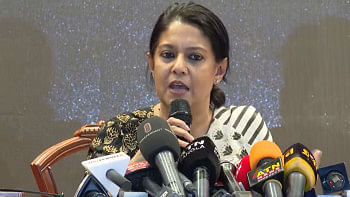How did zebra crossings become death traps?

There could be nothing more symbolic of the utter absurdity of the state of our roads than a zebra crossing stained by the blood of a university student, a road safety campaigner who was crushed by a speeding bus racing with another speeding bus. It is a ludicrous scene by any standards but tragically for us Bangladeshis, it is heartbreaking yet not shocking anymore.
Abrar Ahmed Chowdhury could have been the doctor that he had dreams of being. He might have even been successful in the road safety campaign he believed in and was active in promoting. Alas, that was not to be. In an ironic twist to his story, he was killed in cold blood for following traffic rules—walking over a zebra crossing in a university area.
At this point, one can only helplessly ask: What will it take for something as simple as following traffic rules to be enforced? How many more of our children will have to give their lives before we can ensure that pedestrians will not be crushed on zebra crossings or at bus stops?
It is because nobody really can answer this satisfactorily that students have once again left their classes and the comfort of their homes to be out on the streets screaming for justice. It does not make life any easier for us ordinary citizens who do not have the power to hold traffic to speed away in VIP cars. But what else can these children do except take to the streets, reenacting the passionate campaign they had carried out last year? A campaign that was praised but the lessons of which were not learnt.
We exist at a time when transport owners can actually stall the passing of laws that would make roads safer. Because a sitting minister could also be the president of Bangladesh Road Transport Workers' Federation or the president of Bangladesh Road Transport Owners' Association. It's also because transport owners have the ability to bring a city to its knees just by announcing a strike that will leave millions of citizens stranded.
Last year, on February 28 and March 1, transport workers went on a nationwide "work abstention" for two days, protesting verdicts of courts that punished two drivers on the charge of killing people by reckless driving. It didn't matter to the authorities that hundreds of people suffered immensely because of such a strike, that there were patients in dire need of medical treatment but who could not go to a hospital. It didn't matter that thousands of work hours were lost along with millions of taka to the country's economy. More significantly, these transport strikes were "tolerated" because transport workers have enough political backing to do whatever they want in this country.
Last September, the Road Transport Act-2018 was passed although it had little impact on reducing the number of road accidents or deaths from road crashes. It certainly did not save the life of Abrar Ahmed Chowdhury or many of his fellow human beings. Last year, the number of deaths from road accidents according to police was 2,635 although these numbers are far lower than those given by organisations working on road safety. These statistics moreover do not include the thousands of people who have been injured or permanently maimed or the families who have been psychologically scarred forever or have lost their only earning member. They also do not calculate the loss in productivity to the nation or the loss of wellbeing of a significant number of people who are being added to the demographic of the grief-stricken.
The truth is, it will take much more than the enactment of laws to fix this serial killer known as road crash. The law has to be effective in keeping out from the streets drivers who are underage or under the influence of narcotics or who have no valid licences. But even transport owners, many of whom have strong political links, have to be held liable for their vehicles or their drivers being unfit. Passengers too must not be allowed to get on or get off buses in the middle of the road and safe crossing of roads must be taught from an early age. The ridiculous practice of showing one's hand to stop upcoming traffic in the middle of the street has to be abandoned. The government must delink the political patronage enjoyed by transport owners so that they can be held accountable when they are clearly accomplices in road crashes.
It almost feels banal to be reiterating what, in most countries, is obvious—basic, mundane traffic rules. But, in our reality, even the most commonplace norms of road behaviour cannot be taken for granted. Hence the absurdity of a bloodied university student on a zebra crossing.
Aasha Mehreen Amin is Senior Deputy Editor, Editorial and Opinion, The Daily Star.






Comments